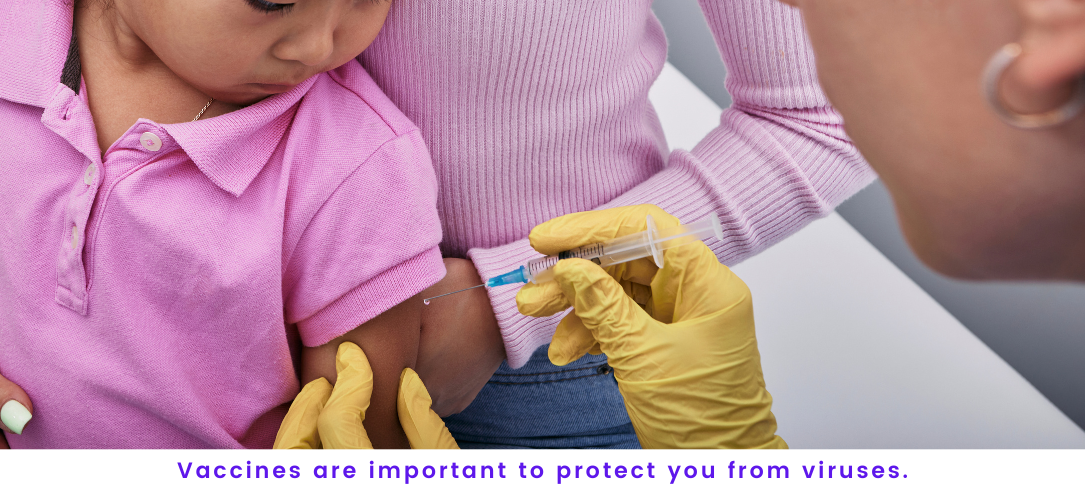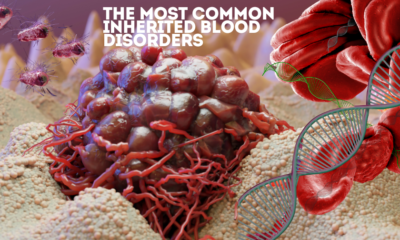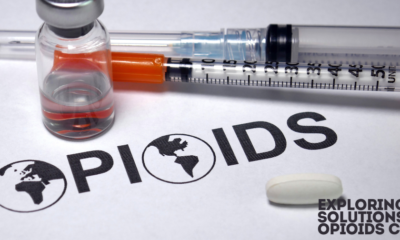Healthcare
The Importance of Childhood Vaccinations: A Parent’s Guide

Vaccinations have been one of the most significant medical advancements in human history, saving millions of lives and preventing countless diseases. For parents, the health and well-being of their children are paramount, and understanding the importance of childhood vaccinations is crucial in ensuring their protection from various potentially life-threatening illnesses. This guide aims to provide a comprehensive overview of the importance of childhood vaccinations, exploring their history, how they work, the benefits, common concerns, and guidelines for parents.
1) A Brief History of Vaccinations
The history of vaccinations dates back to the late 18th century when Edward Jenner, an English physician, developed the first smallpox vaccine in 1796. Jenner observed that milkmaids who had contracted cowpox, a less severe disease, did not catch smallpox. He hypothesized that exposure to cowpox provided immunity against smallpox and tested his theory by inoculating an eight-year-old boy with cowpox. The boy developed mild symptoms but recovered and was immune to smallpox.
This breakthrough laid the foundation for modern immunology and vaccination. The success of the smallpox vaccine eventually led to the World Health Organization’s global smallpox eradication campaign in the 20th century. In 1980, smallpox was declared eradicated, marking a monumental achievement in public health.
Following Jenner’s discovery, vaccines for other diseases were developed, including rabies, diphtheria, tetanus, pertussis (whooping cough), polio, and measles. These vaccines have drastically reduced the prevalence of these diseases, transforming public health and significantly lowering childhood mortality rates worldwide.
2) How Vaccines Work
Vaccines work by mimicking the infectious agents (such as bacteria or viruses) that cause disease without actually causing the illness. They stimulate the immune system to recognize and fight the disease-causing pathogen. There are several types of vaccines, including:
- Live Attenuated Vaccines: These contain weakened forms of the virus or bacteria, such as the measles, mumps, and rubella (MMR) vaccine. They provide strong, long-lasting immunity but are not suitable for people with weakened immune systems.
- Inactivated Vaccines: These contain killed pathogens, such as the polio vaccine. They are safe for people with weakened immune systems but may require booster shots to maintain immunity.
- Subunit, Recombinant, Polysaccharide, and Conjugate Vaccines: These contain parts of the pathogen, such as proteins or sugars, like the Haemophilus influenzae type b (Hib) vaccine. They target specific components of the pathogen and often require multiple doses.
- mRNA Vaccines: A newer type of vaccine, such as the COVID-19 vaccine, that uses messenger RNA to instruct cells to produce a protein that triggers an immune response.
- Toxoid Vaccines: These contain inactivated toxins produced by the pathogen, such as the tetanus vaccine. They protect against the harmful effects of the toxin rather than the pathogen itself.
When a person is vaccinated, their immune system produces antibodies specific to the pathogen. If the person is later exposed to the disease, their immune system recognizes the pathogen and responds quickly to prevent illness. This process is known as immunological memory.
3) The Benefits of Childhood Vaccinations
Childhood vaccinations offer a wide array of benefits that extend beyond the individual child, encompassing public health, community well-being, and even economic stability. Below are the key benefits:
a) Protection from Serious Diseases
Vaccinations protect children from a range of serious and potentially fatal diseases, including measles, mumps, rubella, diphtheria, tetanus, whooping cough, and polio. These diseases can cause severe complications such as pneumonia, encephalitis (brain swelling), paralysis, and even death. By vaccinating children, parents can significantly reduce the risk of their child contracting these illnesses.
b) Herd Immunity
Herd immunity occurs when a large percentage of the population is immune to a disease, making it difficult for the disease to spread. This is especially important for protecting vulnerable individuals who cannot be vaccinated, such as newborns, people with certain medical conditions, or those with weakened immune systems. By vaccinating children, parents contribute to the broader community’s protection, reducing the overall prevalence of diseases.
c) Eradication and Control of Diseases
Vaccinations have led to the control, elimination, or eradication of many diseases. For example, polio has been eliminated in most parts of the world thanks to widespread vaccination efforts. Similarly, routine vaccination has drastically reduced cases of diseases like diphtheria and rubella. Continued vaccination is essential in preventing these diseases from re-emerging.
d) Cost-Effectiveness
Vaccinations are a cost-effective public health intervention. The cost of vaccinating a child is far lower than the cost of treating the diseases that vaccines prevent. This includes direct costs, such as medical expenses, and indirect costs, such as lost productivity and long-term disability care. By preventing illness, vaccines reduce the economic burden on families, healthcare systems, and society as a whole.
e) Enhanced Quality of Life
Vaccinated children are more likely to lead healthy lives, free from the debilitating effects of preventable diseases. They can attend school regularly, participate in social activities, and achieve their developmental milestones without interruptions caused by illness. This contributes to their overall quality of life and well-being.
4) Addressing Common Concerns About Vaccinations
Despite the overwhelming evidence supporting the safety and efficacy of vaccines, some parents have concerns that may lead them to hesitate or refuse vaccinations for their children. It is essential to address these concerns with accurate, evidence-based information.
a) Vaccine Safety
One of the most common concerns is vaccine safety. Parents worry about potential side effects, allergic reactions, or long-term health implications. It is important to note that vaccines undergo rigorous testing in clinical trials and continuous monitoring for safety and efficacy after approval. Side effects are generally mild and temporary, such as soreness at the injection site, fever, or fatigue. Serious side effects are extremely rare, and the benefits of vaccination far outweigh the risks.
b) Autism and Vaccines
The myth that vaccines, particularly the MMR vaccine, cause autism has been thoroughly debunked by extensive scientific research. This misconception originated from a fraudulent study published in 1998 that has since been retracted. Numerous large-scale studies have found no link between vaccines and autism. Leading health organizations, including the World Health Organization (WHO), the Centers for Disease Control and Prevention (CDC), and the American Academy of Pediatrics (AAP), affirm that vaccines do not cause autism.
c) Natural Immunity vs. Vaccine-Induced Immunity
Some parents believe that natural infection provides better immunity than vaccination. While it is true that natural infection can lead to strong immunity, it comes at a significant risk. Contracting diseases like measles, whooping cough, or polio can result in severe complications, long-term disability, or death. Vaccines provide a safe way to develop immunity without exposing children to the dangers of the actual diseases.
d) Too Many Vaccines at Once
Parents may worry that receiving multiple vaccines in one visit can overwhelm a child’s immune system. However, scientific evidence shows that a child’s immune system is capable of handling multiple vaccines simultaneously. The immune system encounters numerous antigens (foreign substances) daily, far more than those contained in vaccines. Spacing out vaccines or delaying them can leave children vulnerable to preventable diseases.
e) Ingredients in Vaccines
Concerns about vaccine ingredients, such as preservatives, adjuvants, or trace amounts of other substances, are common. Vaccine ingredients are carefully selected to ensure the safety and effectiveness of the vaccine. For example, thimerosal, a preservative once used in some vaccines, has been removed or reduced to trace amounts in all routine childhood vaccines, except some flu vaccines. Extensive research has shown that the ingredients in vaccines are safe and do not pose a health risk.
5) Guidelines for Parents: Ensuring Your Child is Vaccinated
To protect children from vaccine-preventable diseases, parents should follow recommended vaccination schedules and guidelines. Here are some key steps parents can take:
a) Follow the Recommended Vaccination Schedule
Health authorities, such as the CDC, provide a recommended vaccination schedule for children from birth through adolescence. This schedule is based on the best available evidence and is designed to provide immunity early in life when children are most vulnerable. Parents should work with their child’s healthcare provider to ensure their child receives vaccines according to the schedule.
b) Keep Accurate Records
Keeping accurate vaccination records is important for tracking your child’s immunization history. This can help avoid missed or duplicate vaccinations and provide proof of immunization for school or travel. Many healthcare providers and public health departments offer tools, such as immunization registries or mobile apps, to help parents keep track of their child’s vaccines.
c) Address Concerns with Healthcare Providers
If parents have concerns or questions about vaccines, they should discuss them with their child’s healthcare provider. Providers can offer evidence-based information, address misconceptions, and help parents make informed decisions about their child’s health. Establishing a trusting relationship with healthcare providers is key to navigating the complexities of vaccine information.
d) Stay Informed About Vaccine Updates
Vaccine recommendations may change over time as new vaccines are developed or additional evidence becomes available. Parents should stay informed about any updates to the vaccination schedule or new vaccines that may be recommended for their child’s age group. Reliable sources of information include the CDC, WHO, and AAP websites, as well as discussions with healthcare providers.
e) Be Aware of School and Travel Requirements
Many schools and childcare facilities require proof of immunization for enrollment. Parents should ensure their child is
up to date on required vaccines to meet these requirements. Additionally, certain vaccines may be recommended or required for international travel, depending on the destination. Parents should consult with their healthcare provider or travel clinic for guidance on travel-related vaccines.
6) The Role of Public Health and Community Support
Public health agencies, healthcare providers, and community organizations play crucial roles in promoting childhood vaccinations. Public health campaigns, educational materials, and community outreach programs aim to increase awareness about the importance of vaccines and address barriers to vaccination.
a) Public Health Campaigns
Public health campaigns use various platforms, including social media, television, radio, and print materials, to disseminate information about vaccines. These campaigns often target specific populations or address particular concerns, such as vaccine hesitancy or low vaccination rates in certain communities. By providing clear, evidence-based information, public health campaigns help parents make informed decisions about vaccinating their children.
b) Access to Vaccines
Ensuring equitable access to vaccines is critical for achieving high vaccination rates and protecting public health. Barriers such as cost, transportation, and lack of healthcare access can prevent families from obtaining vaccines for their children. Public health programs, such as the Vaccines for Children (VFC) program in the United States, provide free or low-cost vaccines to eligible families. Community health clinics, mobile vaccination units, and school-based vaccination programs also help increase access to vaccines.
c) Community Support and Education
Community support and education are essential in fostering a culture of vaccination. Schools, childcare centers, religious organizations, and community groups can play a role in promoting vaccines and dispelling myths. Peer support, such as parent groups or online forums, can also provide valuable encouragement and information for parents navigating vaccination decisions.
Conclusion
Childhood vaccinations are a critical component of public health that protect individuals, families, and communities from a wide range of preventable diseases. By understanding the benefits of vaccines, addressing common concerns, and following recommended guidelines, parents can make informed decisions that safeguard their children’s health. Vaccinations not only protect individual children but also contribute to the broader goal of disease eradication and control, enhancing the quality of life for all.
As parents, staying informed, asking questions, and trusting the guidance of healthcare providers are key steps in ensuring that children receive the protection they need. With continued education, public health efforts, and community support, the goal of preventing vaccine-preventable diseases and promoting healthy childhoods is within reach. By choosing to vaccinate, parents are making a powerful commitment to their child’s health and the health of future generations.
-

 Press Release4 days ago
Press Release4 days agoClinical Trials Market Set for Robust Growth, Driven by Drug Development Surge and Digital Innovation
-

 Press Release5 days ago
Press Release5 days agoFill-Finish Pharmaceutical Contract Manufacturing Market Expected to Flourish Amid Biopharmaceutical Boom and Global Outsourcing Trend by 2035
-

 Business6 days ago
Business6 days agoHow Managed IT Solutions Help Small Teams Compete at Enterprise Scale
-

 Press Release5 days ago
Press Release5 days agoGreen Bio Chemicals Market Poised for Sustainable Growth amidst Global Shift to Eco-Friendly Alternatives by 2035
-

 Press Release5 days ago
Press Release5 days agoIndustrial Boiler Market Expected to Surpass USD 24.4 Billion by 2035 Amid Growing Demand for Energy Efficiency and Industrialization
-

 Press Release5 days ago
Press Release5 days agoPreventive Vaccines Market to Witness Strong Growth by 2035
-

 Press Release5 days ago
Press Release5 days agoPet Food Nutraceutical Market Set for Robust Expansion Amid Rising Demand for Pet Wellness by 2035
-

 Press Release4 days ago
Press Release4 days agoWaterproof Structural Adhesives Market: A Comprehensive Study Towards USD 10.3 Billion in 2035






























